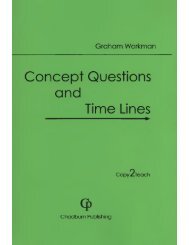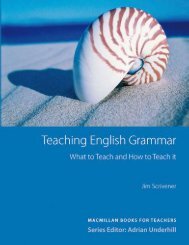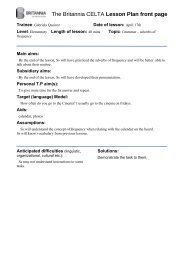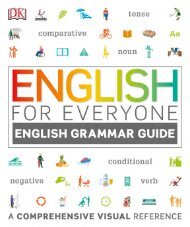CELTA Skills Lesson Plan Sample
Create successful ePaper yourself
Turn your PDF publications into a flip-book with our unique Google optimized e-Paper software.
The Britannia <strong>CELTA</strong> <strong>Lesson</strong> <strong>Plan</strong> front page<br />
Trainee: Heloisa Marino Date of lesson: 23 October, 2015<br />
Level: Intermediate Length of lesson: 40 mins Topic: Listening for gist and for<br />
detail.<br />
Main aims:<br />
By the end of this lesson, students will have developed listening skills for gist and for detail.<br />
Subsidiary aims:<br />
By the end of this lesson, students will have learned vocabulary related to the listening and<br />
expressions for giving suggestions.<br />
Personal T.P aim(s):<br />
- Time management<br />
- Giving feedback<br />
- Setting up tasks<br />
Target (language) Model:<br />
Pre-teach vocabulary: switch off, banned, distracting, strict, cheating<br />
Aids:<br />
- IWB presentation<br />
- Audio (track 42)<br />
-Handouts (H.O. 6.1, 6.2)<br />
Assumptions:<br />
- Students may relate to the topic of the lesson, especially since some are parents<br />
themselves.<br />
Anticipated difficulties (linguistic, organizational, cultural etc.):<br />
a. Meaning<br />
1. switch off: sts may only be familiar with 'turn off'<br />
2. banned: sts may only be familiar with 'prohibited'<br />
3. distracting: sts may confuse distracted (feeling/reaction) and distracting (effect/<br />
situation)<br />
4. strict: L1 interference (false cognates): 'estreito' (narrow)<br />
5. cheating: sts may understand cheating only as meaning to trick somone to make<br />
them believe something which is not true.<br />
b. Pronunciation<br />
1. switch off: pronouncing /swi:ʃ ɒf/
The Britannia <strong>CELTA</strong> <strong>Lesson</strong> <strong>Plan</strong> front page<br />
2. banned: pronuncing //bænɪd/<br />
Stressing word incorrectly due to adding /ɪd/ incorrectly. Oo<br />
3. distracting: pronouncing /dɪˈʃtrækʧi:ŋi:/<br />
4. strick: producing /eʃ/strɪkti:/<br />
Adding extra syllables to word by adding /e/ to the beginning and/or /i:/ to the<br />
end of word.<br />
5. cheating: pronouncing /ʃiːtɪŋ/ producing /ʃ/ instead of /ʧ/<br />
c. Tasks and Material:<br />
1. T might spend more time than intended building context<br />
2. Giving instructions and setting up follow-up activity could be convoluted.<br />
3. I've been having some trouble identifying and giving targeted feedback on sts<br />
errors.<br />
Solutions:<br />
a. Meaning<br />
use visual aids, examples to clarify meaning and ask CCQs.<br />
b. Pronunciation<br />
model and drill words.<br />
Highlight one-syllable words by clapping hands.<br />
c. Tasks and Material:<br />
1. Time stages and tasks.<br />
2. Ask ICQs/Demonstrate activity.<br />
3. Allow enough time at the end for targeted and meaningful feedback. Take notes of<br />
sts correct and incorrect use of language during Lead-in and Follow-up activity<br />
(stress, pronunciation, form, etc) and write them on the board so sts can identify<br />
errors.<br />
REFERENCES:<br />
GOLDSTEIN, B. The Big Picture, Intermediate Student’s Book, First Edition. Richmond<br />
Publishing, 2012. p. 94.<br />
GOLDSTEIN, Ben. The Big Picture, Intermediate Teacher’s Book, First Edition. United<br />
Kingdom, Richmond Publishing, 2012. p. 88-89.<br />
SCRIVINER, J. Learning Teaching, A guidebook for English language teachers. Second<br />
Edition. Macmillan Publishers, 2005. Chapter 7 – Speaking p. 155-157.<br />
SCRIVINER, J. Learning Teaching, A guidebook for English language teachers. Second<br />
Edition. Macmillan Publishers, 2005. Chapter 8 – Receptive <strong>Skills</strong>: listening and reading.<br />
GOWER, R; PHILLIPS, D; WALTERS, S. Teaching Practice: A Handbook for Teachers in<br />
Training. Macmillan Publishers, 2005. p.85-92; 105-107; p. 142-153.<br />
http://dictionary.cambridge.org/<br />
http://www.oxfordlearnersdictionaries.com/
The Britannia <strong>CELTA</strong> Language Analysis<br />
Language Analysis grammar vocabulary functions skills 1<br />
Analysis of Meaning<br />
(Simple statements of meaning)<br />
Anticipated Problems<br />
Possible solutions<br />
e.g. (CCQs (inc. answers), timelines, clines, visuals<br />
etc.)<br />
Vocabulary:<br />
Use visual aids, examples and CCQs:<br />
1. switch off - to turn off an electronic<br />
equipment (such as a phone, tv, light, etc) by<br />
pressing a button or a switch<br />
2. banned - to be officially prohibited.<br />
P1. Sts may only be familiar with 'turn off'<br />
P2. Sts may only be familiar with<br />
'prohibited'<br />
1. If meaning is unclear after visual aid, use<br />
mobile phone or light switch to demonstrate.<br />
2. Is it allowed to smoke in flights? (N)<br />
Is it officially prohibited? (Y)<br />
3. distracting - that takes your attention and<br />
concentration away from what you are doing.<br />
4. strict - to demand that rules and<br />
regulations be respected and followed.<br />
5. cheating - to act in a dishonest way in<br />
order to get an advantage (such as in a<br />
game, competition, exam, etc)<br />
P3. Sts may confuse distracted<br />
(feeling/reaction) and distracting (effect/<br />
situation)<br />
P4. L1 interference (false cognates):<br />
'estreito' (narrow)<br />
P5. sts may understand cheating only as<br />
meaning to trick somone to make them<br />
believe something which is not true.<br />
3. Does (the situation) take your attention<br />
away from what you are doing? (Y)<br />
Do you feel concentrated? (N)<br />
Do you feel distractED? (Y)<br />
4. If the rules are strict are they severe or<br />
are they flexible? (severe)<br />
Is it rigorous? (Y)<br />
5. Can you (usually) look at your classmate's<br />
test during an exam? (N)<br />
Can you consult your phone for answers<br />
during an exam? (N)<br />
Is that dishonest? (Y)<br />
1 In the rare event of a skills lesson with absolutely no target language envisaged, please justify
The Britannia <strong>CELTA</strong> Language Analysis<br />
Analysis of Pronunciation<br />
(Simple statements of meaning)<br />
Anticipated Problems<br />
Possible solutions<br />
e.g. (CCQs (inc. answers), timelines, clines, visuals<br />
etc.)<br />
Vocabulary:<br />
1. switch off - /swɪtʃ ɒf/<br />
Stress: Oo<br />
2. banned - /bænd/<br />
3. distracting - /dɪˈstræktɪŋ/<br />
Stress: oOo<br />
4. strict - /strɪkt/<br />
5. cheating - /tʃiːtɪŋ/<br />
Stress: Oo<br />
P1. Pronouncing /swi:ʃ ɒf/<br />
P2. Pronuncing //bænɪd/<br />
Stressing word incorrectly due to adding<br />
/ɪd/ incorrectly.<br />
Oo<br />
P3. Pronouncing /dɪˈʃtrækʧi:ŋi:/<br />
P4. Producing /eʃ/strɪkti:/<br />
Adding extra syllables to word by adding<br />
/e/ to the beginning and/or /i:/ to the end<br />
of word.<br />
P5. Pronouncing /ʃiːtɪŋ/ producing /ʃ/<br />
instead of /ʧ/<br />
1-5 Model and drill words.<br />
2 and 4: Mark stress by clapping hands.<br />
These are one-sylllable words. Highlight that<br />
if students add sounds they change stress of<br />
word.
The Britannia <strong>CELTA</strong> Language Analysis<br />
Analysis of Form<br />
(Simple statements of meaning)<br />
Anticipated Problems<br />
Possible solutions<br />
e.g. (CCQs (inc. answers), timelines, clines, visuals<br />
etc.)<br />
Vocabulary:<br />
1. switch off<br />
separable phrasal verb<br />
Verb + adverb + object (only on its full form,<br />
not as a pronoun: to switch off the phone)<br />
Verb + object + adverb ( object can go as<br />
pronoun: switch it off)<br />
P1: Wrong position of object.<br />
To switch off it x To switch it off<br />
S1: In case sts are confused, write on board:<br />
She switched the phone off = She swicthed<br />
it off.<br />
She swicthed off the phone => She switched<br />
off it. (cross out to show this is not possible)<br />
Use different colours to hhighlight form.<br />
2. banned<br />
past participle of verb 'ban'<br />
P2: Producing 'baned' instead of<br />
'banned"<br />
S2: present written form on board and<br />
highlight double 'n'.<br />
3. distracting<br />
present participle adjective<br />
Suffixation:<br />
distract (verb) + ing (suffix)<br />
P3: using –ed ending for –ing ending.<br />
S3: Highlight written form:<br />
He is (feeling) distractED<br />
The situation is distractING.<br />
Anticipated problems with tasks and materials<br />
e.g.<br />
Possible solutions<br />
e.g.
The Britannia <strong>CELTA</strong> Language Analysis<br />
a) Ss might not understand new vocabulary in a text<br />
b) complicated instructions for a task<br />
c) difficult listening tasks<br />
a. T might spend more time than intended building context<br />
b. Giving instructions and setting up follow-up activity could be<br />
convoluted.<br />
c. I've been having some trouble identifying and giving targeted<br />
feedback on sts errors.<br />
a) pre-teach vocabulary<br />
b) do a clear demonstration using a student<br />
c) pause CD to give Ss time to write<br />
a. Time stages and tasks.<br />
b. Ask ICQs.<br />
c. Allow enough time at the end for targeted and meaningful<br />
feedback. Take notes of sts correct and incorrect use of language<br />
during Lead-in and Follow-up activities (stress, pronunciation, form,<br />
etc) and write them on the board so sts can identify errors.
The Britannia <strong>CELTA</strong> <strong>Lesson</strong> <strong>Plan</strong> detail<br />
Name: Heloisa Marino Date: 23/10/2015 Length: 40 mins<br />
Stage T Int Aim/Purpose Procedure<br />
Lead-in<br />
5 min<br />
PW<br />
GW<br />
Pre-listening 8min T-Ss<br />
Listening for<br />
gist<br />
3min<br />
IND<br />
To engage sts in the<br />
topic and to set the<br />
context for the listening<br />
To pre-teach<br />
vocabulary to enable<br />
sts to complete tasks<br />
To develop listening for<br />
gist skills<br />
• MM slide 2-6: Show questions for discussion to activate<br />
sts previous knowledge in the subject. Show slides in<br />
time and have sts talk in pairs.<br />
• Show slide 2: “Where do you usually access the<br />
internet? What do you use the internet for?”<br />
• Show slide 3: “Can you live without internet?”<br />
• Show slide 4: “How about children and teens? Can they<br />
live without internet?<br />
• Show slide 5: “Do young people in the 21st century<br />
learn better with internet access? Why? Why not?”<br />
• Show slide 6: “Should schools allow internet access to<br />
students? Should there be some restrictions? Which?”<br />
• Hold 2 min to hear some of sts feedback<br />
• Take note of sts language produced during this stage<br />
for feedback in the end of the class.<br />
• MM slide 7-11: pre-teach vocabulary for listening. Work<br />
on meaning, pronunciation and form.<br />
• Check understanding using visual aids and CCQs,<br />
where necessary.<br />
• Productive vocabulary: switch off, banned, distracting,<br />
strict, cheating<br />
• MM slide 12: Show H.O. 6.2. and refer to Task 1. Tell<br />
sts they will listen to two people discussing Internet<br />
restrictions at their school. Decide if each Speaker is a<br />
teacher or a student and if they are talking about the<br />
same school.
The Britannia <strong>CELTA</strong> <strong>Lesson</strong> <strong>Plan</strong> detail<br />
Stage T Int Aim/Purpose Procedure<br />
• Distribute HO 6.2.<br />
Feedback 2min GW To give feeback<br />
Listening for<br />
detail<br />
Feedback<br />
7min<br />
2min<br />
IND<br />
PW<br />
GW<br />
To develop listening for<br />
detail<br />
To give sts a chance to<br />
compare answers<br />
before group check.<br />
• Show slide 13 for sts to check answers.<br />
• Answer: Speaker 1 ( x) a student<br />
Speaker 2 ( x) a teacher<br />
(x) different schools<br />
• Refer sts to Task 2 in H.O.6.2. Tell sts they will listen<br />
again and mark who said these statements. Highlight<br />
that the Speakers don’t use the exact words in the<br />
sentences.<br />
• Say: “Listen again and decide who said these<br />
statements: Speaker 1, Speaker 2 or both. The<br />
Speakers will not say these exact words (gesture) so<br />
listen carefully for the details.”<br />
• ICQ: “Will the speakers say these exact words?” (N)<br />
“Can you mark more than one Speaker for a<br />
sentence? (Y)<br />
• Play the recording once, have sts compare their<br />
answers, then play a final time.<br />
• Have sts check again with different partners, to see if<br />
they agree before showing slide 15.<br />
• Answers: 2. Speaker 1 and 2<br />
3. Speaker 1<br />
4. Speaker 2<br />
5. Speaker 1<br />
6. Speaker 2
The Britannia <strong>CELTA</strong> <strong>Lesson</strong> <strong>Plan</strong> detail<br />
Stage T Int Aim/Purpose Procedure<br />
Follow-up<br />
8min<br />
T-S<br />
PW<br />
Feedback 5min GW<br />
To personalise the topic<br />
and promote freer<br />
practice on the topic.<br />
To give feedback on<br />
task and content.<br />
• MM slide 16: Tell sts to imagine that situation: “A<br />
student in Riverside School was caught cheating in a<br />
History test using a smartwatch. The school<br />
coordination organised a meeting with students,<br />
teachers and parents to discuss the future use of<br />
technology in the classroom...”<br />
• Show cards from H.O. 6.3 and say: “Imagine you are<br />
students, teachers and parents at Riverside School and<br />
you were called to this meeting”<br />
• Say: “ You will receive a card with information about<br />
your character. You have 2min to read and prepare<br />
yourself for the meeting.”<br />
• MM slide 17. Tell sts to use these expressions while<br />
they are discussing.<br />
• Divide the class in groups of 3. Distribute cards from<br />
H.O. 6.3. to each group.<br />
• Monitor and time activity.<br />
• Make notes of sts language (correct and incorrect)<br />
• Write down some correct and incorrect sentences on<br />
the board and have sts comment on them.
1. Listen to two people discussing Internet restrictions at their<br />
school.<br />
a. Decide if each Speaker is a teacher or a student.<br />
Speaker 1:<br />
( ) a teacher<br />
( ) a student<br />
Speaker 2:<br />
( ) a teacher<br />
( ) a student<br />
b. They’re talking about:<br />
( ) the same school<br />
( ) different schools<br />
2. Listen again. Who says these statements?<br />
Speaker 1 Speaker 2<br />
1 Internet access is possible on the school computers. ✓ ✓<br />
2 There are some restrictions to internet use.<br />
3 Mobile phones are generally not allowed in class.<br />
4 Mobile phones are often used in lessons.<br />
5 Mobile phones can be distracting.<br />
6<br />
It's important to know about the dangers of using<br />
the internet.
STUDENT<br />
• You are a 14 year-old student at<br />
Riverside School.<br />
• You often use your mobile phone in<br />
class to do research and to prepare a<br />
presentation.<br />
• You also use your phone to check<br />
social media when the teacher is not<br />
looking.<br />
• Your parents want to put you in a<br />
different school because they think<br />
access to Internet in class is too<br />
distracting.<br />
• Convince your parent during the<br />
meeting that it isn’t distracting.<br />
PARENT<br />
• You are a parent of a 14 year-old student<br />
at Riverside School.<br />
• You don’t think students should have<br />
access to the Internet in the classroom<br />
because it’s too distracting.<br />
• You were very worried after the cheating<br />
incident at your child’s school and you<br />
are thinking of putting your child in a<br />
different school.<br />
• During the meeting, ask for more<br />
restrictions to Internet access in the<br />
classroom and more information about<br />
safety on the web.<br />
TEACHER<br />
• You are a History teacher at Riverside<br />
School.<br />
• You often allow students to use mobile<br />
phones in class to do research and to<br />
prepare presentations.<br />
• You saw a student cheating in your test<br />
using a smartwatch and you are<br />
reconsidering if students should be<br />
allowed to use technology in the<br />
classroom<br />
• During the meeting, suggest that all<br />
electronic equipment should be<br />
prohibited on the day of the exam.











